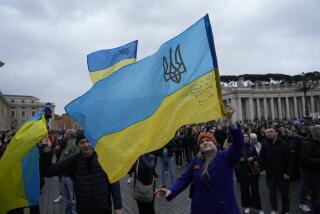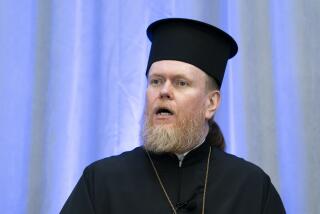Force Justified to Save Bosnians, Bishops Tell U.S.
- Share via
Warning that the survival of entire ethnic groups in Bosnia-Herzegovina is in jeopardy, the nation’s Roman Catholic bishops told the Clinton Administration on Wednesday that military force to end the bloodshed is justified.
“We are convinced that there is just cause to use force to defend largely helpless people in Bosnia against aggression and barbarism that are destroying the very foundations of society and threaten large numbers of people,” Roman Catholic Archbishop John R. Roach wrote in a letter to Secretary of State Warren Christopher.
Roach, chairman of the U.S. Catholic Conference’s international policy committee, cautioned that basic moral rules should be observed, including the protection of innocent civilians. His letter represents the official position of U.S. Catholic bishops.
The bishops’ position is in sharp contrast to their initial opposition to U.S. military intervention during the Persian Gulf War. It comes at a time of growing, if cautious, support among U.S. religious leaders of various denominations and faiths for exercising the military option in Bosnia.
In Chicago, the Rev. Herbert W. Chilstrom, head bishop of the Evangelical Lutheran Church in America, said Wednesday he has informed his church’s 65 bishops that he will “give sober support” to military action if “just war” conditions have been met.
Meanwhile, the National Council of Churches this week is urging leaders of its 33 member Protestant and Orthodox communions to endorse a statement that, while remaining opposed to air strikes and lifting the arms embargo, backs the use of American peacekeeping troops in Bosnia under U.N. command.
If that effort fails, the council statement concludes, “we cannot in good conscience block besieged populations from access to means of self-defense.”
Earlier, the presiding bishop of the Episcopal Church took note of the difference between Bosnia and Kuwait, where the United States mounted a major war to push out Iraqi occupying forces.
“Those of us who opposed the Gulf War believed that war was not the answer,” the Most Rev. Edmund L. Browning said. “But today we find ourselves confronted with an evil war, the sure elimination of which may be possible only by means of armed intervention.”
The growing willingness of some Christian denominations to take a hard-line position follows urgent calls by Jewish and Muslim groups. Until now, most Christian churches have been uncommitted to military force even as they decried the genocidal “ethnic cleansing,” predominantly by Bosnian Serbs, and mounted refugee relief efforts.
The developments may also have exposed an attempt by “hawks” on the National Security Council staff to marshal public pressure on behalf of military action in Bosnia--and to direct it at Christopher. In the Administration’s internal debates over Bosnia, NSC chief Anthony Lake has been a strong advocate of more action, while Christopher has been one of the most cautious voices, officials say.
As recently as last week, NSC officials Samuel (Sandy) Berger and Nancy Soderberg were in contact with the National Council of Churches and Jewish groups to keep them abreast of developments in Bosnia. By encouraging the religious leaders, even discreetly, to make their views known, the two officials appeared to be engaging in a time-honored Washington stratagem: creating outside pressure in favor of their internal position.
Berger and Soderberg did not respond to inquiries.
“It was our belief that while they weren’t asking, we could be helpful in mobilizing public opinion and transmitting public sentiment to the White House,” said Jason Isaacson of the American Jewish Committee.
In April, 13 national Jewish organizations and 117 Jewish communities launched a national campaign urging the Clinton Administration to act immediately to stem the bloodshed and ethnic cleansing.
Rabbi Eric Yoffie, vice president of the Union of American Hebrew Congregations, the national body of Reform synagogues, said: “We shared the skepticism of many when the initial reports (of genocide) came in. But as they became more graphic . . . it had an enormous impact on the Jewish community. It is bad enough, and close enough and comparable enough (to the Holocaust) that the Jewish community felt a profound obligation to respond morally, whatever the strategic issues.”
Archbishop Roach, in a telephone interview from Minneapolis, said there was no White House involvement in the Catholic bishops’ statement. But he said the rhetoric in the letter was more “aggressive” than previous statements on Bosnia.
“We took that original stand when the circumstances were both less severe and when there was more hope. Gradually . . . the horror has just escalated,” Roach said.
In Roach’s letter to Christopher, the archbishop stressed that military force should always be used as a last resort and that in the case of Bosnia, there is “no real military solution.” He also said that warfare poses grave moral questions, especially about the safety and rights of civilians and, more practically, the chances of success.
Times staff writers Doyle McManus and John M. Broder in Washington contributed to this report.
More to Read
Sign up for Essential California
The most important California stories and recommendations in your inbox every morning.
You may occasionally receive promotional content from the Los Angeles Times.













